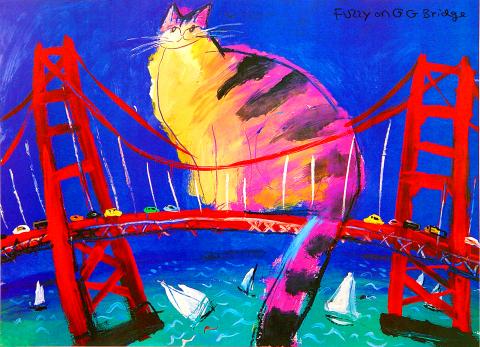An Odyssey of Dreams (童夢) starts off with a dark tone, as main subject Michael Leu (呂游銘) describes a recurring nightmare where he is being chased.
“I committed a serious crime, and they want to catch me,” he says, as he walks through a desolate landscape in the US, where Leu, a former interior designer and illustrator, emigrated to at age 33 to make it as an artist.
But much of the documentary, directed by Lai Chun-yu (賴俊羽), including the strings-and-piano driven soundtrack, is playful and whimsical, seemingly to match Leu’s personality and colorful art that mostly features cats of various sizes.

Photo courtesy of White Crane Films
Shot between 2011 and last year, there’s no clear timeline throughout the entire film as we can only vaguely detect which events happened in which order by the length of Leu’s hair. Within the first 20 minutes or so, we jump from Leu driving through the American West to him talking about his cat at his California home, then to his wife talking about how they met in Taiwan, and finally back on the road without clarifying whether it was the same road trip.
But this disorder does not detract from the film. Rather, it is more of an abstract but informational way of directing the audience’s attention on Leu as a person and not so much about the events that take place. The dialogue mostly takes the form of Leu’s stream-of-consciousness musings while he snaps photos of seagulls or sets up a booth at an art show, while we hear the more structured bits from other characters such as his family members and childhood friends.
From imitating a tiger’s roar to attract the attention of deer for a photograph, then analyzing the effectiveness of his action to simply describing a window in his house, Leu is always intriguing and endearing, and as a result the film has very few dull moments. It’s not all fun and games, though, as Leu also talks about his past, his work ethic, and his determination to make it in America.

Photo courtesy of atmovies.com
Another element that makes the format work is the transitions, as there is always a substantial set-up to a certain topic, often with bits that show more of Leu’s personality and life story. Some of these seem like devices to incorporate interesting but perhaps otherwise irrelevant shots into the film, but they help make the randomness less jarring. For example, there’s a long scene of Leu riding the subway in New York and snapping photographs in Times Square before we get to him visiting and interacting with his parents — and even that is a transitional device as then the camera turns to a family photo in the parents’ house, which leads the real topic at hand — Leu’s children.
The film’s tone changes about two-thirds into the film, as the audience probably has a good idea of who Leu is by then. The topics become more serious as Leu addresses his demons mentioned in the opening scene, and there is now a storyline going on as the scenes become longer and start following a chronological order.
At this point, the film starts featuring fantastic animations of Leu’s drawings and paintings to go with the narrative, which is director Lai’s forte as he was part of the team that won a Golden Horse for best visual effects with the 2007 film, Secret (不能說的秘密). It also starts employing a variety of fun effects such as adding a microphone echo to Leu’s voice when he recites a speech by his elementary school principal.
One may lament that Lai did not incorporate these flourishes earlier in the film, but since they are not Leu’s creations, perhaps they would have taken away from the sole focus on him and his work.

Jacques Poissant’s suffering stopped the day he asked his daughter if it would be “cowardly to ask to be helped to die.” The retired Canadian insurance adviser was 93, and “was wasting away” after a long battle with prostate cancer. “He no longer had any zest for life,” Josee Poissant said. Last year her mother made the same choice at 96 when she realized she would not be getting out of hospital. She died surrounded by her children and their partners listening to the music she loved. “She was at peace. She sang until she went to sleep.” Josee Poissant remembers it as a beautiful

March 2 to March 8 Gunfire rang out along the shore of the frontline island of Lieyu (烈嶼) on a foggy afternoon on March 7, 1987. By the time it was over, about 20 unarmed Vietnamese refugees — men, women, elderly and children — were dead. They were hastily buried, followed by decades of silence. Months later, opposition politicians and journalists tried to uncover what had happened, but conflicting accounts only deepened the confusion. One version suggested that government troops had mistakenly killed their own operatives attempting to return home from Vietnam. The military maintained that the

Before the last section of the round-the-island railway was electrified, one old blue train still chugged back and forth between Pingtung County’s Fangliao (枋寮) and Taitung (台東) stations once a day. It was so slow, was so hot (it had no air conditioning) and covered such a short distance, that the low fare still failed to attract many riders. This relic of the past was finally retired when the South Link Line was fully electrified on Dec. 23, 2020. A wave of nostalgia surrounded the termination of the Ordinary Train service, as these train carriages had been in use for decades

Lori Sepich smoked for years and sometimes skipped taking her blood pressure medicine. But she never thought she’d have a heart attack. The possibility “just wasn’t registering with me,” said the 64-year-old from Memphis, Tennessee, who suffered two of them 13 years apart. She’s far from alone. More than 60 million women in the US live with cardiovascular disease, which includes heart disease as well as stroke, heart failure and atrial fibrillation. And despite the myth that heart attacks mostly strike men, women are vulnerable too. Overall in the US, 1 in 5 women dies of cardiovascular disease each year, 37,000 of them